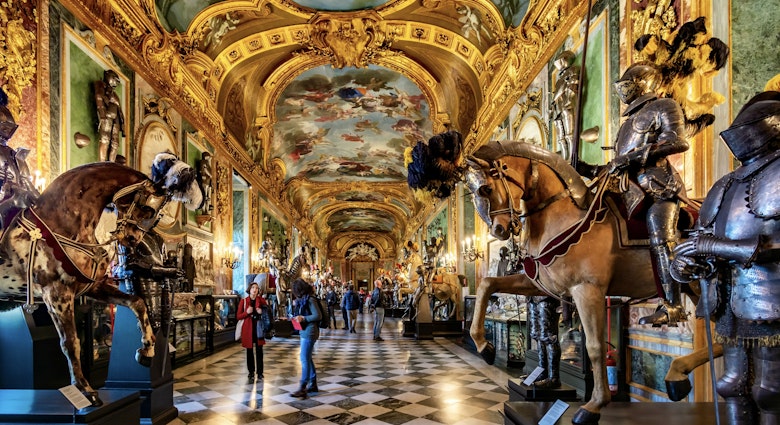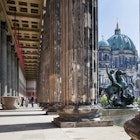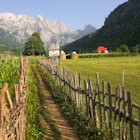
Discover how this couture designer brings sustainable fashion to Columbus, Ohio

Jan 20, 2020 • 6 min read

For every luxurious high-end gown that comes out of the Malvar=Stewart studio in Columbus, Ohio, there's an in-depth answer to the go-to red carpet question, "Who are you wearing?" But it's one that goes far beyond the name Celeste Malvar-Stewart, the designer behind this eco-friendly atelier.

Depending on the piece, the answer could be RayRay, Poppy or Bart – the names of some of the alpacas, Angora goats, and Lincoln Longwool sheep from which Celeste sources the fibers that go into her couture creations. She gets to know the animals personally, and they are the inspiration behind many of her creations, which also include ready-to-wear pieces and home décor.
Visitors to Columbus, Ohio can get a glimpse into Celeste's creative process as Malvar=Stewart leads day-long farm-to-fashion workshops. These unique experiences start in the country and end at Hangar 391, her two-story atelier in the city's historic German Village neighborhood. It's there that participants like myself learn skills like wool-felting techniques to create one-of-kind scarves.

A trip to Fairie Haven Farm
My scarf features contributions from both Coco and Chanel—two names I'll be dropping for a long time to come, though I'm not referring to the French couturière anymore than RayRay refers directly to Ray Eames. But more on that in a moment.
We stop at Fairie Haven Farm, which couldn't be further away from the runways and red carpets of Paris, Milan, New York or even Columbus, for that matter. The owner and self-described shepherdess, Rachel Najjar, is the first to admit she's not at all fashionable as she pulls on mud-covered work boots over jeans she's paired with an oversized, hand-knitted gray wool sweater.

Yet Najjar was the only Ohio farmer to return one of several cold phone calls Malvar-Stewart made when she first sought out raw wool for her haute-couture pieces. She's since established relationships with a few others.
"I remember listening to Celeste's message and going, 'What?!'" Najjar laughs. "I didn't quite understand, but I was intrigued because I am interested in fashion and how it's produced. She immediately had my interest, so I invited her out to meet the flock. I didn't think she knew what she was getting into, though. Raw wool is dirty and full of poop and hay."

Columbus, Ohio is the Paris of the Midwest
Several years on, Malvar-Stewart looks perfectly at home slogging through ankle-deep mud at Fairie Haven. A quintessential city girl, Malvar-Stewart was raised in San Francisco and lived in New York City just before moving to "kicking and screaming" to the Midwest when her husband was recruited by Nationwide Children's Hospital.
Once she settled in, however, she discovered that Columbus has, in fact, a thriving arts and fashion scene. All it took for to feel at home was going to the Short North Arts District for Gallery Hop, an event held on the first Saturday of every month. It also helps that the city has the third-largest concentration of fashion designers in the United States, thanks to a cluster of retail clothing brands headquarters including Victoria's Secret and Abercrombie & Fitch.

But it was another quality of the agricultural, 4-H focused Midwest – namely, proximity to local fiber farms – that gave Malvar-Stewart new inspiration for her own craft and set her on a path toward being a more sustainable fashion designer.
"I started off as conventional designer and realized how much waste I was creating," she explains. "Then it hit me. I decided to study fiber in New York so I could understand how I can make zero waste. But I didn't start working with the raw wool until I came to Columbus. And by sourcing it locally, I can keep my carbon footprint down."

A goat named Gandalf
In the barnyard, she points out her first-ever fiber donor, a now elderly Lincoln Longwool sheep with bow legs. "That's Gandalf. Isn't he the cutest?" she says enthusiastically. "He's got such a beautiful face. You just want to kiss him. Rachel calls him the 'gentle giant.'"
Gandalf is more than just a pretty face. He may look rough and tumble now, with mud and rust stains on his lower half, but his long curly locks – characteristic of the heritage breed – clean up nicely. Once washed, his wool becomes a snow white shade that's an ideal material for use in the custom-made wedding dresses Malvar-Stewart designs.

"I put Gandalf on every single wedding gown," Malvar-Stewart says, "even if it's just a little bit."
To keep up her supply of Gandalf, not to mention fiber from other sheep, she heads into Najjar's barn to pick through bag after bag of wool from the latest shearing. There's a great deal of variety in the texture and color of each animal, which can range from almost white to coal black. Ultimately, Malvar-Stewart will head back to the studio with a half-pound of her beloved Gandalf, plus a half-pound of Aiden; a pound of Poppy, whom she favors for her dark crimped curls; and a pound of lighter brown-colored Stardust.
Related content: Fancy an insider shopping trip to all the major designer outlets in Florence?
Enjoy the simple life at these 10 agritourism farm stays around the world
Midwest travel ideas: 8 under-the-radar destinations to visit in America’s Heartland

Crafting one-of-a-kind fashions at Hangar 391
Back at her German Village studio, surrounded by some of the inspiring custom pieces she has been working on, Malvar-Stewart's pupils gather around a long table covered in blue bubble wrap ready to learn how she transforms raw fiber into ethereal works of art.
When I think of wool, I think of chunky woven sweaters like the one Rachel wore on the farm. Looking around the room I see that many of Malvar-Stewart's pieces are instead flowy and whispy – almost as if they would float away if not tethered to the human body.

The technique she employs is called nuno felting, in which she uses water and friction to blend and press loose wool fibers into a sheer fabric, such as the long, narrow piece of light-weight silk gauze Malvar-Stewart places in front of me to form the base of the scarf we'll be designing. Then it's time to select the wool that will keep us warm on a frigid day.
My goal is to use the softest wool I can find. Malvar-Stewart steers me toward alpaca, which is as warm as wool and as soft as cashmere. Fluffing a chunk of alpaca fiber in her hand, it becomes as light as air. "It's like holding a cloud," says one of the other participants, taking it her hands.

That settles it. I choose a dark fiber sourced from an alpaca named RayRay, who lives on Bluebird Hills Farm in Springfield. His felted wool appears black, which matches the majority of my wardrobe. I contrast it with a nearly white alpaca named Coco. Finally, I edge the scarf with light gray curly locks from Chanel, a Lincoln Longwool from Chaotic Farm in Medina. Malvar-Stewart takes a look at what I've done and nods in approval.
There's no other garment or fashion accessory that I have ever bought on any of my travels that gives me as much joy as the felted scarf hanging on a coat hook in my entryway. Having a hand in creating the piece is extremely gratifying. More importantly, though, it feels as if Malvar-Stewart's spirit—not just the animals' wool—intertwines with every fiber of the piece. And it makes me smile.
Malvar=Stewart's farm-to-fashion workshops can by arranged by appointment. A half-day workshop in her German Village studio costs $185, while a full-day tour including a visit to Fairie Haven Farm for $350 per person. Hotel Leveque, a Marriott Autography Collection property, can arrange a tour that includes an overnight stay in the 1927 Art Deco masterpiece in downtown Columbus.
Explore related stories









